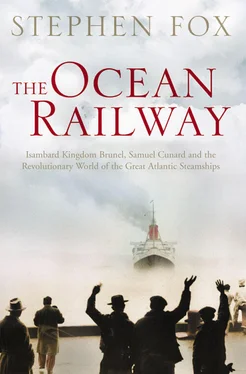As this crisp transaction made clear, Sam in his late twenties was functioning as the head of the entire family. The firm of A. Cunard & Son really consisted of the son. Sam also assumed responsibility for the education of his three youngest brothers. He sent Henry and Thomas, eleven and ten years old, to a private school in Pictou, Nova Scotia. ‘ If you thinkit best, I have no objection to Henry & Thomas learning Latin,’ he wrote to the schoolmaster, Thomas McCulloch, a Presbyterian minister from Scotland. ‘The only reason I have for not requesting you to teach them Latin, namely that they are intended for business and that a plain English education answers the purpose. You will say that I have very contracted ideas and I must allow it. I shall feel much obliged if you will have the kindness to supply the little wants of the boys from time to time, they will require as the winter approaches worsted socks, and strong shoes which can be had at Pictou better than here.’
Sam was not satisfied with the educational progress of his brother John, fifteen years old, so McCulloch was given another charge. ‘ The mastersunder whose care he has been heretofore,’ Sam explained, ‘have paid but little attention to his improvement and what he learnt at school he has forgot within the last year.…I wish him taught what I requested you to teach the other boys, and I hope within one year (the time I propose leaving him with you) that he will have made considerable improvement. ’ Sam’s uncertain grasp of grammar and punctuation at times revealed the limits of his own education; he often neglected to end sentences with full stops and to start sentences with capital letters, and his spelling could be erratic. But he wanted more schooling for his brothers, despite his businesslike doubts about the real value of learning Latin, and was willing to pay for a privilege he himself had not enjoyed.
Halifax in these years had a population of about 15,000. Seen from the water, it looked like a giant rectangle laid sideways on the slope of a hill: six major streets running parallel to the harbour, intersected at right angles by ten smaller cross streets. Two miles long by a half mile wide, Halifax was capped by a fortress called Citadel Hill and a prominent tower displaying the town clock. Ships, docks and warehouses were ranged thickly along the waterfront. Only Water Street, closest to the harbour, was paved; the other streets were often muddy or dusty, and buried in deep snow from December to March. These conditions, along with the steepness of the hill, made carriages impractical. People got about on foot or horseback. The houses, built to no particular pattern, were mostly wooden, of one storey, and unpainted.
High society was divided between a small gentry class and a massive military presence. The old settlers and the Loyalists, initially at odds, by now had intermarried and merged their interests. The Loyalists had brought money, energy, and a new assertiveness to the small town. The oligarchy that dominated Halifax consisted essentially of the children of those Loyalists. Allegiances to the mother country still ran deep, in both politics and culture. Newcomers were struck by the pervading Englishness of the place. ‘ Nova Scotia approachesnearer, in most respects, to the customs and ideas most approved in England, than any other part of America,’ one British visitor noted. ‘The style of living, hours of entertainment, fashions, manners, are all English. Dress is fully as much attended to as in London.’
This Anglophilia was reinforced by British military power. Halifax was both a naval station and garrison town, its streets filled with soldiers and sailors. Three regiments lived in barracks on the north and south sides of Citadel Hill. Brunswick Street, running between the barracks, was littered with well-patronized grog shops, gambling dens and whorehouses. (The Cunards lived in a better section of Brunswick Street.) Returning to barracks at night, drunk and frisky, the soldiers and sailors would pick fights with each other and commit small vandalisms. Native Haligonians prudently stayed indoors, out of their way, at such times.
Military officers and the local oligarchy mingled at the Ionic-columned Province Buildingin the centre of town, in the middle of a square enclosed by an iron railing. It was easily the most impressive structure in Halifax, 140 feet long by 70 feet wide by 45 feet high, built to last of locally quarried ironstone. Here met the meshed institutions of Nova Scotian government. The English monarch appointed a governor for the province, who appointed a Council which could amend or reject any bill passed by the Assembly, which was elected by male Nova Scotians who owned houses or land. The Council also designated sheriffs, coroners and school commissioners and could review some judicial decisions. Occasional democratic pressures from below were, as yet, easily stifled.
In sum: Halifax was a small but quite diverse place, from the deliberating chambers of the Province Building to the nearby dives along Brunswick Street. For a young man on the make like Sam Cunard, it had some of the fluidity of a frontier town, unformed and open to enterprising newcomers. But political power was mostly appointive, beyond any popular control; individual leaders of the oligarchy, in general, came from more privileged backgrounds than Cunard’s. Henry H. Cogswell, Richard J. Uniacke and Thomas Chandler Haliburton were college-educated lawyers. Joseph Howe, the crusading editor of the Halifax Novascotian, was the son of a postmaster general and king’s printer. The father of the three Bliss brothers was a Harvard graduate who served as attorney general and chief justice of New Brunswick; the Blisses would pepper their letters with French aphorisms and Greek quotations, in the original Greek. The two Young brothers were literate, well-educated lawyers and politicians from Scotland. Moving in such civilized, professional company, Cunard must at times have felt intimidated and culturally inadequate.
His career nonetheless flourished. Just after the war, he obtained his first royal mail contract: a foreshadowing of his later transatlantic steamship line. Given his command of ships and shipping, and useful contacts among the military authorities in Halifax, he was chosen to carry the mail between Boston, Halifax, and St John’s, Newfoundland; occasionally his sailing packets also took letters all the way to Bermuda. The steady performance of his mail ships, year after year, gave him a reliable reputation with British authorities that would help clinch subsequent dealings. ‘ I have alwaysfound the Government very liberal and reasonable, ’ he said later, ‘where the Contractor has endeavoured to fulfill his engagement I have never met with the least difficulty.’
After Abraham Cunard’s death early in 1824, Sam changed the name of his firm to Samuel Cunard & Company. The new name reflected the long-established reality. Sam took his brothers Edward and Joseph into the firm; his oldest brother, William, had recently died in a shipwreck. On formal occasions Sam now called himself Samuel Cunard, Esquire. The Cunard brothers built an imposing office and warehouseon Water Street, on one of the waterfront plots their father had bought back in the 1790s: a four-storey stone fortress that stretched 110 feet along the street, with a large arched doorway in the middle giving secured access to the wharves. From this solid base, the family engaged in shipping, shipowning, shipbuilding, whaling, timber, iron and coal mining, landowning, property management and banking. Most of these enterprises succeeded, but ships were always at the base of everything else.
In 1825 Samuel Cunard obtained another crucial connection to British imperial power. The quite English province of Nova Scotia thirsted for real tea, which at the time was produced only in China. Lacking a consistent supply of the genuine article, people had to resort to peppermint, cloves, or aniseed – all deemed poor substitutes. Cunard sailed to London to petition the controlling East India Company for his own tea agency. ‘ Our pretensionsare grounded upon our long residence in the Provinces,’ he wrote in one of his run-on sentences, ‘and a thorough knowledge of the Trade and People, we possess every convenience in Fireproof Warehouses and means to effect the intended object, we are ready to give such security in London…and should you think proper to appoint us to the Agency and management of the proposed Consignments and future business of the Hon. Company you may rely upon our zeal and attention thereto and we shall be happy to give such information’ – and so on. The besieged company granted him the agency.
Читать дальше












